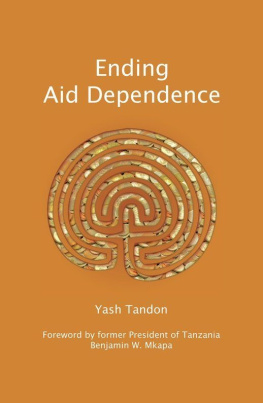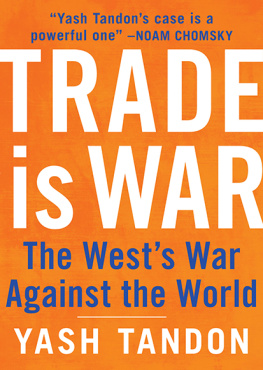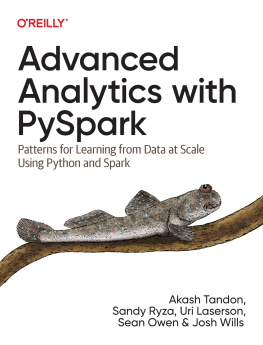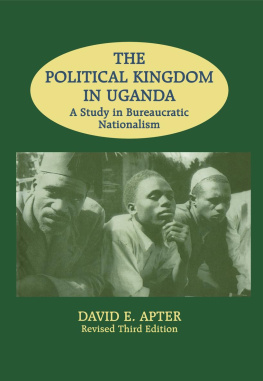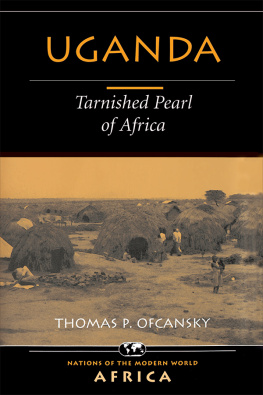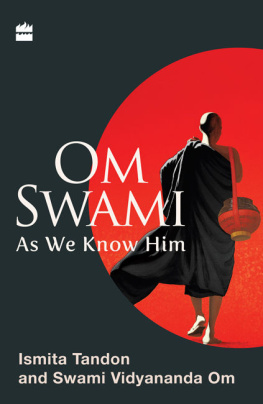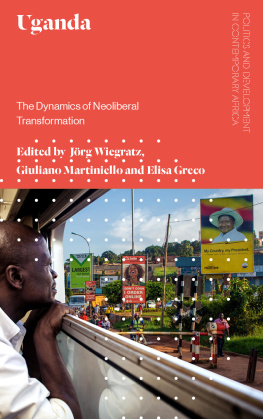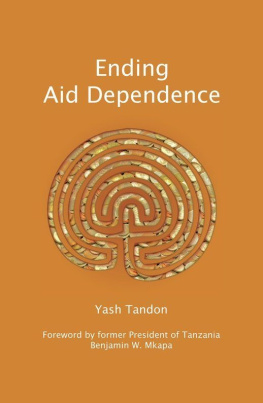Yash Tandon - Common Peoples Uganda
Here you can read online Yash Tandon - Common Peoples Uganda full text of the book (entire story) in english for free. Download pdf and epub, get meaning, cover and reviews about this ebook. year: 2019, publisher: UNKNOWN, genre: Politics. Description of the work, (preface) as well as reviews are available. Best literature library LitArk.com created for fans of good reading and offers a wide selection of genres:
Romance novel
Science fiction
Adventure
Detective
Science
History
Home and family
Prose
Art
Politics
Computer
Non-fiction
Religion
Business
Children
Humor
Choose a favorite category and find really read worthwhile books. Enjoy immersion in the world of imagination, feel the emotions of the characters or learn something new for yourself, make an fascinating discovery.

- Book:Common Peoples Uganda
- Author:
- Publisher:UNKNOWN
- Genre:
- Year:2019
- Rating:4 / 5
- Favourites:Add to favourites
- Your mark:
- 80
- 1
- 2
- 3
- 4
- 5
Common Peoples Uganda: summary, description and annotation
We offer to read an annotation, description, summary or preface (depends on what the author of the book "Common Peoples Uganda" wrote himself). If you haven't found the necessary information about the book — write in the comments, we will try to find it.
Common Peoples Uganda — read online for free the complete book (whole text) full work
Below is the text of the book, divided by pages. System saving the place of the last page read, allows you to conveniently read the book "Common Peoples Uganda" online for free, without having to search again every time where you left off. Put a bookmark, and you can go to the page where you finished reading at any time.
Font size:
Interval:
Bookmark:
Published in Kenya in 2019by Zand Graphics
Yash Tandon
All rights reserved. Except brief passages for review purposes, no part of this publication may be reproduced, stored in a retrieval system, transmitted in any form or by any means, electronic, mechanical photocopying, recording or otherwise, without the prior written permission of the author.
ISBN 9966-7123-5-6Design and LayoutSufyan Slatch
Cover ConceptHenry Macharia COMMON PEOPLES UGANDA
In Memory of:
Ignatius K Musazi and Semakula Mulumba who united us all.John Kakonge and Dani Wadada Nabudere who showed us the way.
 Ignatius K Musazi
Ignatius K Musazi  John Kakonge
John Kakonge  Semakula Mulumba
Semakula Mulumba 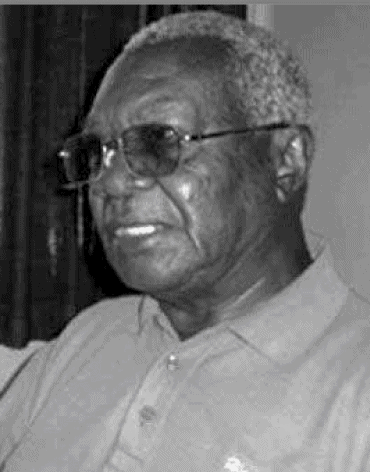
Our party has been the vanguard of mass struggle against colonialism and imperialism. The economic control of our country is not in the hands of our people and continues through the continued exploitation of our people by a handful of comprador capitalists and their agents. International monopoly capital, the father of imperialism and neo-colonialism, is the most dangerous enemy to our people.
[From: The Fundamental Basis of the Uganda Peoples Congress, UPC Gulu Conference, 1964)]I take the publication of this book as an opportunity to remember and acknowledge my (and our collective) debt to our heroes now with us only in spirit - among them, besides I K Musazi, John Kakonge and Dani Wadada Nabudere, Kabaka Mutesa II, Milton Obote, Raiti Omogin, Peter Kinuka, John Kale, Wadada Musani, Natolo Masaba, Masumba Mukhwana, Jayant Madhvani, Picho Ali, Robert Serumaga, Sam Katabarwa, Sam Magara, Abasi Kibazo, Chango Machyo, Omwony Ojwok - and countless others who gave their life to the cause of Ugandas freedom.
I am particularly grateful to Ngugi wa Thiongo for his Preface to the book, and my close comrade and friend, Edward Rugumayo, for his Foreword.
In 2016-17, I spent time at the Prime Ministers Delivery Unit (PMDU). I want to thank Rt. Hon. Ruhakana Rugunda, Prime Minister; Hon. Kirunda Kivejinja, Second Deputy Prime Minister and Minister of East African Affairs; and Professor Ezra Suruma, Head of the PMDU and Chancellor of Makerere University, for deep and insightful discussions with them on the present and future of Uganda.
I must add my deep appreciation of my colleagues at the Southern and Eastern African Trade, Information and Negotiations (SEATINI) for the excellent work they have done in advancing an alternative nationalist agenda to issues related to trade, investments and intellectual property since SEATINIs foundation in 1996.
To Zahid Rajan and Zarina Patel, my publishers, I cannot thank enough for their painstaking efforts in the editing, proofreading and publishing process.
Last but not least, I owe my debt to my family, among them especially, Nidhi, Vivek and Maya Nidhi for her supplements to the original text and meticulous editing and book promotion; and Vivek and Maya for supporting my research and travels. As for my wife of over half century, Mary, words of thanks do not suffice to describe your love and infinite patience and tolerance.
vABPAfrican Business Promoters Ltd
ACPAfrican, Caribbean and Pacific
AGOA(US) African Growth and Opportunity Act AMISOM African Union Mission to Somalia
AUAfrican Union
BCGABritish Cotton Growing Association
BRICSBrazil, Russia, India, China and South Africa CMCCommon Mans Charter
CMPCapitalist Mode of Production
DDRDoha Development Round
DPDemocratic Party
EACEast African Community
EALAEast African Legislative Assembly
ECAEconomic Commission for Africa
EPAEconomic Partnership Agreement
EU, ECEuropean Union, European Commission FDCForum for Democratic Change
FoEFriends of the Earth
FRONASA Front for National Salvation (of Uganda) GATTGeneral Agreement on Trade and TariffsG7United States, Canada, Britain, France, Germany,
Italy and Japan
GSP(EUs) Generalised scheme of preferencesIGGInspector General of Government
IIDSIntransigent Imperial Denial Syndrome IISSInternational Institute of Strategic Studies LRALords Resistance Army
LTUEALabour Trade Union of East Africa
MDGsMillennium Development Goals
MFIMicro Finance Institution
MFN(WTOs) Most Favoured Nation (principle) NAMNon-Aligned Movement
NAMANon-agricultural market access
NATONorth Atlantic Treaty Organization
NGONon-governmental organization
NIEONew International Economic Order
NRANational Resistance Army
NRMNational Resistance Movement
ODAOfficial Development Assistance
OECDOrganization for Economic Cooperation and
Development PEAP Poverty Reduction Action PlanPPPPeoples Progressive Party
PRSPsPoverty Reduction Strategy Papers
S & DSpecial and Differential treatment under GATT/WTOSAP Structural adjustment programme
SDGsSustainable Development Goals
TRIPs Trade Related Intellectual Property Rights UAMDA Uganda African Motor Drivers Association UBS Uganda Bureau of Statistics
UCB Uganda Commercial Bank
UCSBUganda Credit and Savings Bank
UDBLUganda Development Bank Limited
UDCUganda Development Corporation
UFAUganda Federal Alliance
UGCSUganda Growers Cooperative Society
ULCUganda Labour Congress
UNUnited Nations
UNCUganda National Congress
UNCTADUnited Nations Conference on Trade and
Development
UNDPUnited Nations Development Programme UNFCCCUN Framework Convention on Climate ChangeUNHCRUnited Nations High Commissioner for RefugeesUNLFUganda National Liberation Front
UPCUganda Peoples Congress
USAIDUnited States Agency for International DevelopmentVHTsVillage Health Teams
WTOWorld Trade Organization
Preface:Ngugi wa Thiongo xiiiForeword:Edward RugumayoxvIntroduction: Why this Book?1
PART ONE5A brief geopolitical survey of ugandas pastCHAPTER 1:7Imperial conquest and resistance
1.Introduction
2.The birth of Uganda
3.Resistance during colonisation
4.Imperial capture of state and economy
5.How Britain siphoned off savings from the common people6.How Uganda supported Britain in the Second World War7Mining and Industrialisation
CHAPTER 2: 18The struggle for independence
1.Introduction: the National Question
2.The creation of the proletariat
3.I K Musazi, Bana bi Kintu and the Bataka Movement4.Rise of the Co-operative Movement
5. Unionisation by the working classes
6. Consequences of the Second World War
7. 1945 and 1948 riots
CHAPTER 3: 27Beginnings of the formation of a neo-colonial state
1.What is a neo-colonial state?
2.The birth of Uganda as a neo-colonial state
3.The Lancaster House Constitutional talks and independence4.Summing up
CHAPTER 4: 34Neo-colonialism And Resistance (1962-1986)
Introduction:The general context of multilateral imperialism1.Phase one: Neo-colonialism under Obote I (1962-1971)2.Phase Two: Neo-colonialism under Amin (1971-1979)3.Phase three: The UNLF period (April 1979-April 1980)4.Phase Four: The Obote II period (1980-1985)
The current realities (1986-2018)
Font size:
Interval:
Bookmark:
Similar books «Common Peoples Uganda»
Look at similar books to Common Peoples Uganda. We have selected literature similar in name and meaning in the hope of providing readers with more options to find new, interesting, not yet read works.
Discussion, reviews of the book Common Peoples Uganda and just readers' own opinions. Leave your comments, write what you think about the work, its meaning or the main characters. Specify what exactly you liked and what you didn't like, and why you think so.

